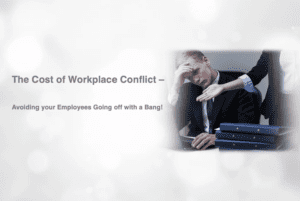The Cost of Workplace Conflict – Avoiding your Employees Going off with a Bang!
The Cost of Workplace Conflict – Avoiding your Employees Going off with a Bang!
The greatest resource a business has is its people. If your employees are happy, they will be your greatest asset and build the reputation of your business. Workplace conflicts are an unfortunate but inevitable part of professional life. They can stem from a multitude of sources, each with its unique set of consequences. The financial cost to organisations has long been a matter of speculation and has certainly increased since 2017, as claimants no longer have to pay any fees to make an Employment Tribunal claim. Have you considered how you would deal with a conflict in your workplace and the potential cost to your reputation?
What does Conflict Look Like?
- Personality Conflicts
- Communication Issues
- Workload Distribution
- Competing Goals
- Resource Allocation
- Performance Issues – real or perceived.
- Differences In Management Styles
- Discrimination and Harassment
- Cultural Differences
- Change Management
- Micromanagement
- Bullying
- Whistleblowing
- Disagreements Over Salaries and Benefits
- Personal Issues spilling over into the workplace
What might it do to your Team?
- Stress and Anxiety
- Reduced Job Satisfaction
- Decreased Productivity
- Lower Morale
- Decreased Collaboration
- Absenteeism
- Turnover
- Health Issues
- Burnout
What Might it Cost your Business?
A recent report titled ‘Estimating the Costs of Workplace Conflict’ conducted by Professor Richard Saundry and Professor Peter Urwin, in collaboration with the CIPD, has revealed the substantial financial impact of workplace conflicts on organisations. The headline statistic from the report is striking: “conflict costs the UK £28.5 billion a year.” Aside from the financial cost, the cost to your reputation could be devasting if the conflict is allowed to escalate.
Can you Avoid Conflict?
Getting to know your team allows you to foster good working relationships, anticipate potential conflicts, understand personal pressures affecting them, and address problems they might be experiencing with colleagues or the job itself. Find out what matters to them individually and how they like to work to ensure they feel secure, supported, and included. Treat all employees equally to build working relationships based on mutual trust and respect – favouritism can lead to resentment and fuel conflict. Be a role model and set the standards that they should follow in interactions within the team and with others. Try to avoid getting involved in office politics or gossip so that you can maintain objectivity and promote an open and respectful working environment. Ensure you are available and encourage them to share problems by demonstrating that you are listening and by showing empathy. Having regular one-to-one meetings should create an environment where team members feel comfortable discussing their concerns about projects or team issues.
Intervening Early
Workplace conflicts can escalate if left unaddressed, and as a manager, it’s your responsibility to intervene proactively. Handling conflicts positively can improve team morale, retain talent, and reduce absenteeism.
Be aware of simmering tensions, alert to any signs of serious conflict developing and address inappropriate behaviour promptly. Be confident in challenging any hint of inappropriate behaviour, like sexist remarks or personal insults, to establish a zero-tolerance approach to unfair treatment. One individual’s negative behaviour or poor performance can disrupt the entire team so address this early.
If the Worst Happens…
If conflicts arise, talk to each team member individually to gather their perspective and, if appropriate, bring conflicting parties together to communicate openly and seek resolution. If necessary, remove individuals from conflict situations to prevent further tension. If the problem affects the whole team in a direct way, consider a team meeting to discuss a possible way forward. After resolving conflicts, follow up to ensure a lasting resolution.
Remember to refer to your Company policies and, if there is a serious complaint or an individual wants a formal investigation you must ensure that they know how to pursue a grievance and that you have taken the correct steps and recorded information correctly. By following these steps and proactively managing workplace conflict, you can create a more harmonious and productive work environment for your team. This is a good point to take stock and reflect on the situation. Don’t be afraid to ask your HR Specialist for advice if you haven’t already done so.
Key Facts
- The cost of workplace conflict to UK organisations is approximately £28.5 billion, equivalent to over £1,000 for each employee.
- Nearly 10 million people experience conflict at work annually, with more than half reporting stress, anxiety, or depression as a result.
- Just under 900,000 employees took time off work, nearly half a million resigned, and over 300,000 were dismissed due to conflicts.
- Conflict costs increase as conflicts progress, especially when they lead to resignation or dismissal.
- Engaging in discussions with managers and HR can mitigate costs.
- Conflict resolution through formal processes is more expensive, costing over three times more than informal resolutions.
Conclusion
Workplace conflicts are not only disruptive but also costly to organisations. The recent study’s findings highlight the importance of addressing conflicts proactively and through effective resolution mechanisms. This proactive approach can reduce the financial burden on organisations, improve employee well-being, and ultimately lead to a more harmonious and productive work environment.
If you have a situation like this and feel like you may need some support or guidance, please contact one of the Tick HR team, and we will be more than happy to help you.


